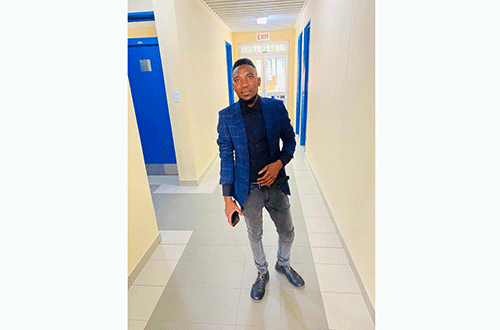The duties of a teacher are much more than standing at the front of a classroom and presenting lessons. They are second parents to children – influential figures with whom they spend an immeasurable amount of time during their most formative years.
Behind the scenes, a lot of work goes into planning and preparing for lessons, as well as providing additional support to students. This is according to Haingura Valentinus Haingura.
“Some people believe the teacher’s primary role is to teach children to behave and judge what is right and wrong. But what I picked up is that teachers play the role of second parents to the pupils. It is them who correct the pupils if something goes wrong – like what they do on their children” he said.
Born at Nyondo village in Ndonga Linena constituency, Kavango East region, Haingura is an infant in teaching.
He joined the public service in 2020 as a Rumanyo language teacher at Katukuta Primary School after obtaining a degree in education from the University of Namibia.
In an interview with New Era, Haingura confirmed he enjoys being a teacher – even though his childhood dream was to become a scientist.
“I always wanted to work for the government but as a scientist. I always wanted to become a pioneer in producing our own local medicine,” he said.
“Growing up in the village was always a challenge because you are growing up among other children who have different views on education, depending on what their parents wanted them to do at that time, which is either to herd cattle or go to school,” he said.
Challenges
There is no occupation without challenges – and for Haingura, getting to know learners and understanding their different learning abilities, motivating and encouraging them when they underperform, dealing with parental and peer pressure as well as building an effective communication channel between the school-parents-students are some of the issues he found challenging.
“The biggest challenge for any teacher lies in understanding the different learning abilities of the learners. Children differ in their grasping, memory, concentration, and ability to learn and write, as well as show varied interests in various subjects. You might find that a learner who is good at Mathematics may find grasping the concepts of Biology difficult. So, also, a student may be good at sports and other co-curricular activities but does not show the same attention and interest when it comes to academics.
Some students are exceptionally brilliant and hard-working, while others are slow learners who struggle to understand what is being taught in the class,” Haingura said.
To address such challenges, Haingura opts to always focus and invest more time in the slow learners.
“I don’t like the idea of comparing and criticising students on the basis of grades and marks scored, and that should never be encouraged by a teacher,” he said.
Haingura believes that nowadays, students not only have to cope with academic and peer pressure but also deal with unrealistic parental expectations. This leads to unprecedented stress for the students.
“The biggest challenge for any teacher will be as to how he motivates, guides and encourages the students when they underperform, lose their focus and are distracted due to various circumstances,” he said.
Haingura, therefore, urged other teachers to “lend a shoulder, a word of comfort and support, as well as instil confidence and a positive attitude towards the students at all times”.
Achievement
Haingura said in his first year of teaching, he was awarded as the best-performing teacher at school. He also served as a National marker for Namibia Senior Secondary Certificate (NSSCO).
Haingura said he plans to serve in public service “for long but not forever. I need to get myself time to make money and do other things.”
In his wish list, Haingura aims to further his education to become a language expert and become a lecturer.


